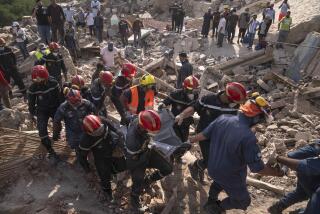Morocco Indicts 6 More Suspects in Casablanca Blasts
- Share via
MADRID — Moroccan authorities announced the indictments of six more suspects Thursday in this month’s suicide bombings in Casablanca, a case that has taken an unexpected twist with the death in custody of a chief suspect.
Authorities provided new details about the dead man, who allegedly organized the synchronized attacks that killed 43 people on May 16. The suspect, a 30-year-old who owned a small shoe store in the city of Fez, had been ill with chronic heart problems and a severely enlarged liver caused by medication, officials said.
An autopsy established that he died of natural causes Wednesday after being arrested two days earlier in Fez, according to Moroccan and Spanish officials. His condition worsened during an interrogation and he died en route to the hospital, authorities said.
“He was gravely ill when he was arrested,” Shakib Larousi, a Moroccan government spokesman, said in a telephone interview. “The prosecutors found no indications that he had been physically abused.”
Moroccan officials reiterated their suspicions Thursday that international terrorists played a supervisory role in the attacks, which were carried out by Moroccan extremists. European investigators said the investigation has reinforced their view that the Al Qaeda terrorist network inspired and directed the bombers, who were working-class men in their late teens and early 20s.
Nonetheless, the alleged organizer’s death contributes to unanswered questions about a case in which Moroccan police are being assisted by investigators from Spain, France, Italy, the United States and other countries. Spanish, French and Italian citizens were among those killed, but most of the victims were Moroccan.
Saying they wanted to keep the investigation confidential, Moroccan officials declined to disclose the full name of the alleged ringleader Thursday. They identified him only by his first name, Abdelhak, and his nickname, Moul Sebbat, which means “shoe seller.”
European investigators expressed concern Thursday about complications arising from the death of Abdelhak, who as a suspected leader would have been key to uncovering the Moroccan network’s foreign contacts.
“It’s obviously a strange development,” a high-ranking Spanish law enforcement official said. “It’s unfortunate. We still are convinced the attacks have a relationship to Al Qaeda. But we need more information.”
Determining the exact role of Al Qaeda is inherently difficult because of the organization’s loose structure. Now more than ever, Al Qaeda is a far-flung alliance of multiethnic networks with a leadership core that provides expertise, financing, training and inspiration to groups that have autonomy to select targets and propose plots.
The initial profiles of the bombers, 12 of whom died in the attacks, did not suggest an international dimension. There were no university radicals or known veterans of Afghan training camps among them. They came from a small, rather primitive group that has violently enforced a puritanical brand of Islam almost exclusively in the slums of Casablanca.
Their rudimentary explosives contrasted with the sophisticated coordination of the simultaneous attacks on a hotel, a Spanish restaurant, a Jewish cultural center, a Jewish cemetery and a Jewish-owned Italian restaurant, according to the Spanish law enforcement official. The apparent common thread among the targets was that they were places where Moroccans and Westerners mixed and engaged in “infidel” activities such as drinking and bingo, the Spanish official said.
But Moroccan investigators have learned that some of the suspects were trained for their suicide mission in a foreign country, which authorities have not publicly identified, Larousi said. Investigators are also pursuing trails of several suspects that lead to Europe, a longtime base for the ideological and logistical networks of North African terrorists.
One of the Moroccan bombers spent enough time in Europe to have been arrested and expelled with an order barring him from all the Western European nations whose borders are governed by the Schengen immigration treaty, according to the Spanish law enforcement official. Italian police are investigating phone calls and other contacts between another of the dead men and Moroccan immigrants in several Italian cities, an Italian police official said.
In addition, at least one of the dozens of extremists arrested by Moroccan police since May 16 is suspected of having trained at one of Osama bin Laden’s camps in Afghanistan, the Italian police official said. That suspect is married to an Italian woman and lived in Italy. But it is not clear whether he played a role in the Casablanca plot or has been swept up in the ensuing crackdown, the Italian official said.
This week’s developments also show that the network had a wider scope within Morocco. Abdelhak lived in Fez, about 150 miles from Casablanca. So did several of the six alleged accomplices whose indictments were delivered Wednesday and made public Thursday, according to Moroccan officials.
The six new suspects face charges of criminal conspiracy, sabotage, premeditated murder and endangering domestic security, among others.
The new indictments bring the total number of formal suspects to nine. Three suspects indicted Monday were two bombers who survived the attacks and one who was allegedly trained to commit a bombing in another city. His confession led police to others in the conspiracy, authorities said.
More to Read
Sign up for Essential California
The most important California stories and recommendations in your inbox every morning.
You may occasionally receive promotional content from the Los Angeles Times.













